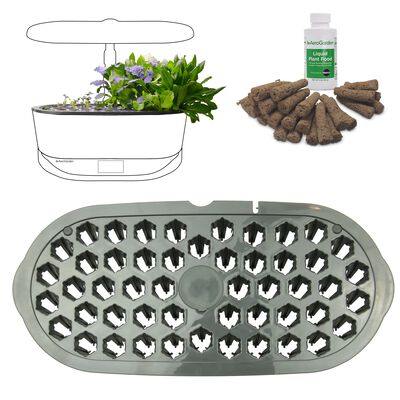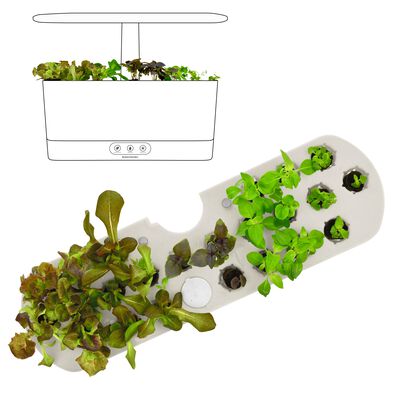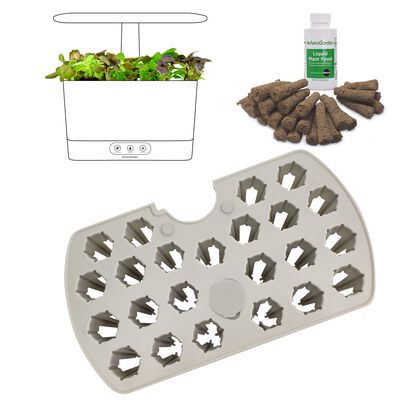
Safe Bug Repellents You Can Make At Home
There are ways to rid your plants of bugs without using chemicals, and all you need are some common household ingredients!
It's the end of June and your garden should be in full swing. Your tomatoes are starting to show plump, juicy fruit, your herbs are going crazy, and your lettuce is ready to be harvested (all of which you transplanted from your AeroGarden Seed Starting System). Nothing is stopping you from enjoying your time tending to your garden…except, what is that? Half your tomato plant has been eaten away by some pest and there are holes in your lettuce.
Does it make you cringe when you think of buying a bug repellent from the store? Here you are growing your own organic (or at least pesticide free) garden, and the last thing you want to do is spray on toxic chemicals because of some pesky insects. Fortunately, there are ways to rid your plants of bugs without using chemicals, and all you need are some common household ingredients!
Dish Soap
Something every household should have on hand is dish soap. All you need to do is mix 2.5 tablespoons of dish soap with 2 cups of water in a bottle and spray plants with the solution. Make sure you get it all over the plant, including under the leaves. Soap will dehydrate soft bodied insects such as aphids and spider mites. You can re-apply every 5-7 days until the insects have been controlled.
Garlic
While us humans can't seem to get enough of garlic, bugs on the other hand cannot stand the strong odor. There are a couple methods of using garlic as a bug repellent.
- Stick a clove of garlic into the soil to keep bugs away (bonus, it will naturally compost).
- Garlic, Mint Spray – you can view the recipe and directions here: https://anoregoncottage.com/homemade-garlic-mint-garden-insect-spray-really-works/
- Garlic Chili Spray – Boil 4 cups water, 1 head of chopped garlic, 1 small chopped onion, 1 tsp cayenne pepper, & 1 tbsp dish soap. Let sit for 12-24 hours to infuse, then transfer into a spray bottle.
Any of these methods should deter ants, aphids, caterpillars, whiteflies, beetles, termites, borers, slugs, and armyworms.
Pepper
Similar to the garlic method, bugs do not like the smell or feel of pepper. Mix 2 tablespoons red pepper, 6 drops of dish soap and 1 gallon of water, and spray your plants. Black pepper, chili pepper, dill, ginger and paprika also work because they contain capsaicin, which repels spider mites and other insects.
Alcohol
Rubbing alcohol has many uses and one of them can be targeting unwanted bugs. Dip a cotton swab into the alcohol and apply it directly on the pests. Be careful not to touch your plant, because it can damage your plants tissues. You can also dilute the alcohol with water. Good for dehydrating soft bodied insects.
Beer
While not a repellent, it actually attracts snails and slugs. Bury a half full can of beer to trap and prevent these creatures from munching on plant leaves and roots.
More Repellents with less common household items:
Neem Oil
A top choice for us here at AeroGrow, neem oil can be found at a garden center and is safe for pets, but destroys an insect's life cycle, including all stages of their development (the egg, larvae, and adult). A little neem oil goes a long way. Just mix 2 tsp pure, cold-pressed Neem oil with 1 tsp liquid soap and 4 cups water.
Pyrethrum spray
This natural insecticide is made from dried chrysanthemum flowers. Mix the powder with water and dish soap to create a spray. This spray paralyzes flying insects on contact.
Diatomaceous Earth
A sedimentary rock that consists of Diatoms (fossilized algae), that is abrasive and essentially dehydrates the bugs to death. To use just sprinkle on the foliage or on the soil around your plants. To get a full effect, reapply it after every rain.
*After using any of these methods, make sure to rinse all your produce before you consume.
Don't let unwanted bugs ruin your garden when you have so many simple and non-toxic ways to get rid of them!
Sources:
https://www.thedailygardener.com/natural-homemade-insecticides
https://www.angi.com/articles/insects-bugging-your-plants-try-these-10-natural-insecticides.htm




